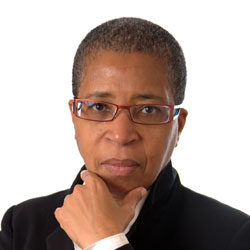IV
History doesn’t enter here, life, if you call it that,
on this small street is inconsequential,
Julia, worked at testing cultures and the stingy
task, in every way irredeemable, of saving money
Then Alan came, his mother, left, came ill
squeezing a sewing machine into a hallway
and then the baby. Already you can see how
joylessness took a hold pretending to be joy
Once she had risen, reprieved from the humus subway,
heard his sermonizing, sent to her by the wind
on the harp of children and leaves and engines,
she bolted the sound of his voice pursuing
She had been expecting happiness with him, why not
a ravishing measureless happiness, he spilled instead
suspicions on her belly, where was the money
she was saving, where the light she was keeping from his hands
She would waken to find the luminous filament
of his cigarette, he rage red as the tip,
weeping, he couldn’t take it any more. Then threats.
She tried tenderness. What? She must take him for a fool
The worn velvet, the late condolences
for a thing buried long before his death. Julia
sees malediction in the sly crucifix,
her back bent over specimens plotting rapture
Notes on the Poem
Dionne Brand entrances us through many effects skilfully interwoven throughout the text of thirsty, her 2003 Griffin Poetry Prize shortlisted work. Some of the most powerful of those effects are also the most subtle, as evidenced in section IV of the book-length poem. Punctuation is placed in somewhat unexpected fashion throughout this section of thirsty. If you simply read words in the section aloud, how the punctuation would fall based on how the words and phrases are ordered does not match what is on the page. Conversely, if you read the poem aloud and interject pauses and full stops where punctuation appears on the page, your reading runs on in some places and sounds disjointed in others. At the end of each stanza, it appears and sounds like there should be full stops at the end of those lines, but they're left open-ended, even though the start of the following stanza starts with a capitalized word and appears and sounds like the start of a new thought and sentence. We've examined before how punctuation or its selective appearance or absence influences how we read, comprehend, react and respond to the themes or emotions the poet is attempting to convey. Here, punctuation placement creates a fractured tempo from stanza to stanza, over fragmented descriptions of increasingly unhappy circumstances. The phrase early on "life, if you call it that," sounds resigned and sardonic, followed by "you can see how joylessness took a hold pretending to be joy" and there is fear in "she bolted the sound of his voice pursuing" after "She had been expecting happiness with him" there is only rage and frustration "the luminous filament of his cigarette, he rage red as the tip, weeping," The loose, random punctuation seems to underscore situations and relationships coming unraveled. The unpunctuated endings seem to suggest something going on and on without resolution. Then again, is there a measure of hope in the last unresolved phrase? "plotting rapture"
